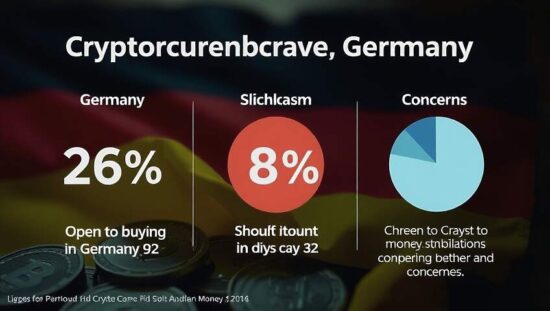German Cryptocurrency Interest Reveals Skepticism and Curiosity
A recent survey by the German IT industry association, Bitkom, has shed light on the attitudes of the German population towards the purchase of cryptocurrencies. The findings indicate that a quarter of Germans (26%) are open to buying cryptocurrencies, while 8% have already done so and a further 4% plan to in the future.
The most open to the idea of purchasing cryptocurrencies are individuals aged 30-49, with nearly a third (31%) expressing interest, having already done so, or planning to in the future.
The main reasons for Germans who are open to the idea of purchasing cryptocurrencies include a lack of trust in the state and central banks, as well as the hope of making a profit. Two-thirds (66%) of those who are open to the idea of purchasing cryptocurrencies are dissatisfied with the monetary policies of central banks and are seeking alternatives.
Other motivations for purchasing cryptocurrencies include a desire to experiment and try something new, with 22% of those who have purchased or are open to purchasing cryptocurrencies citing this as a reason. Some 17% believe that digital currency is a part of a modern society, while 9% are using or are open to using cryptocurrencies as a long-term investment.
However, the majority of Germans who are not open to the idea of purchasing cryptocurrencies are held back by the fear of losing value, with three-quarters (76%) of those who do not support the idea citing this as a reason.
Half of the respondents also expressed skepticism about the environmental impact of cryptocurrencies, with 47% believing that the high energy consumption of the system makes it unsustainable. Additionally, many Germans are uncertain about the purpose of cryptocurrencies, with 44% saying they do not know what they are used for.
The survey also highlights the concerns of Germans about the potential risks of purchasing cryptocurrencies, including the fear of theft, the complexity of the process and the risk of being scammed.





